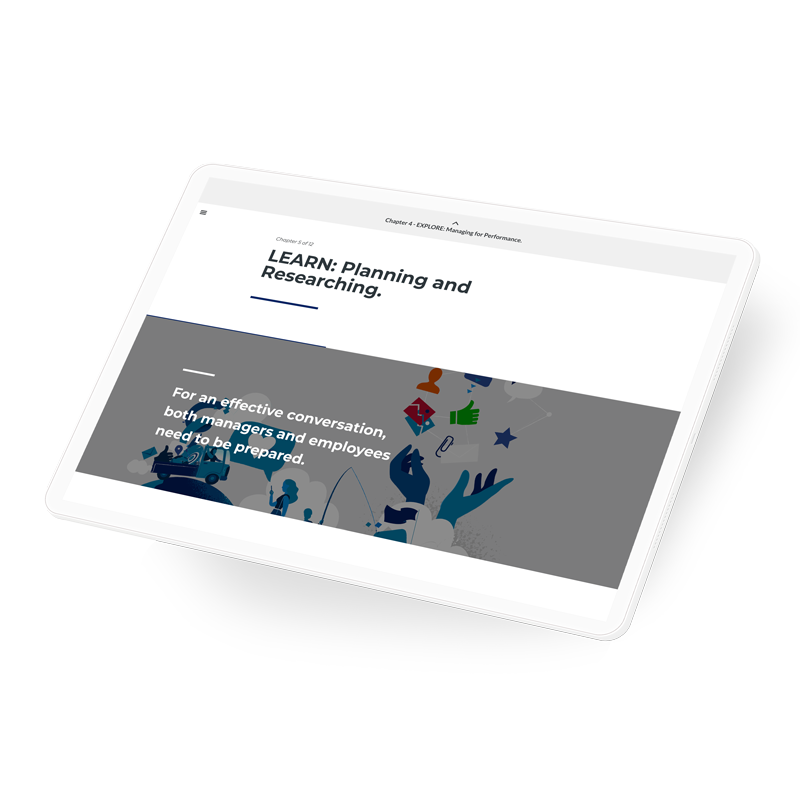
The Right Chemistry: ALTANA’s Award-Winning Onboarding Programme

ALTANA AG is a global leader in specialty chemicals headquartered in Wesel, Germany.
The ALTANA Group offers innovative, environmentally compatible solutions for coating manufacturers, paint and plastics processors, the printing and packaging industries, the cosmetics sector, and the electrical and electronics industry.
ALTANA employs around 7,000 people worldwide in four business divisions and generated sales of over 3 billion euros in 2022.
Who are we exactly?
The business divisions that make up ALTANA each operate under their own brands. They offer premium products and a comprehensive array of services to customers worldwide, leveraging the group’s combined knowledge and wealth of experience. ALTANA’s guiding principles and its four corporate values of Appreciation, Openness, Empowerment to Act and Trust serve as a mandatory basis for joint, goal-oriented action for all employees.
The project team was tasked with communicating these values and the ALTANA identity and culture uniformly to all people across all locations and divisions throughout the organisation. And that called for a global, digitalised onboarding programme. The group already had local onboarding programmes. But there was no group-wide e-learning system to give new hires an overview of the entire organisation. And certainly not one that harmonised with ALTANA’s guiding principles.
The team also had to design a training programme for future leadership personnel. The brief: a system that could onboard new leaders with key leadership guidelines and illustrate a leader’s typical working day.

Three-hour e-learning programmes for new hires and leadership personnel
“We knew we had taken on a truly mammoth project,” says Andrea Pfister from ALTANA’s Talent Management CoE. “We wanted a modular e-learning system with interactive elements, videos and trailers. Onboarding@ALTANA had to be aimed at both new hires and long-serving colleagues. The idea was to have multiple options for newcomers to get to know our organisation and its culture and people. We also wanted established employees to be able to refresh their knowledge at any time.
Consequently, we took great pains to find the right provider. We needed someone who met the technical criteria, obviously, but the personal chemistry had to be right too. We knew it was going to be a long-running project that would require close consultation and intensive dialogue.”
Ines Conrad, project manager at imc, adds: "The project was also a great challenge for us as a supplier. Although there was a large number of 'individual, different' materials, these had to be combined into a sensible whole. And, of course, completely new modules had to be developed together with the technical experts. But it was also a great opportunity because it gave us a free hand and allowed us to be creative."

A greenfield project
The ALTANA team was open to creative ideas and to relying on the expertise and recommendations of the imc team. Following a joint kick-off meeting on site, ALTANA opted for a programme comprising two different but interlocking parts. The first part was the general onboarding programme – mandatory for new employees and voluntary for the old hands.
The second part was the training programme specifically for leadership personnel. The idea was that existing employees moving up into leadership roles would only have to do the leadership part. External leadership appointees, on the other hand, would have to complete both parts.
Silver Award from Brandon Hall Group and excellent in-house feedback
The result of the project is nothing short of impressive: a colourful array of e-learning formats structured into two modular, target group-specific curricula. The programme starts with an invitation e-mail and a teaser trailer that includes a welcome message from the Management Board. The content itself is delivered via web-based training sessions, with learning supported by performance cards and the Readiness Check feature. The programme also integrates the imc BizQuiz format.
This result certainly impressed the jury at human capital management gurus Brandon Hall Group, the sponsor of the annual HCM Excellence Awards. The programme won ALTANA and imc silver in the Talent Acquisition category at the 2023 awards.
The project’s success is also evident from the results of employee surveys conducted by ALTANA. In those surveys, both onboarding programmes scored over 4 on a scale of 1 to 5 – a great result.
Needless to say, ALTANA is very happy. “We are absolutely delighted with the result. What’s more, the project taught us a lot, including about communication and internal stakeholder management,” explains Andrea Pfister. “imc was an extremely enjoyable, pragmatic, open and reliable partner to work with at all times.”


Getting to Climate Neutral: Global Action Day Plus Professional Development

The Schaeffler Group, headquartered in Herzogenaurach, Germany, is a leading global supplier to the automotive and industrial sectors. True to its motto “We pioneer motion,” the company has been driving forward ground-breaking developments in the fields of motion and mobility for more than 75 years.
With innovative technologies, products and services for CO₂-efficient drives, electric mobility, solutions for automotive suspensions, Industry 4.0, digitalisation, and renewable energies, the company is a reliable partner for making motion and mobility more efficient, intelligent and sustainable.
The Schaeffler Group currently has about 84,000 employees spread across some 200 locations in over 50 countries. In 2022, it generated sales of approximately 15.8 billion euros.

Um dieses Video sehen zu können, müssen die Marketing Cookies aktiviert werden. Klicken Sie auf den Playbutton, um diese zu akzeptieren. Mehr Informationen finden Sie in unserem Cookie Banner und in der Datenschutzerklärung.
90 minutes of climate neutrality brainstorming worldwide
Schaeffler aims to be completely climate neutral by 2040. Its in-house production will be climate neutral by 2030, and its entire supply chain will achieve climate-neutrality by 2040. “That’s a very ambitious goal, certainly, but we are utterly determined to achieve it,” emphasises Nadja Lemke, Schaeffler’s Senior Vice President Global Branding & Marketing.
“But, of course, we will only succeed if everyone gets onboard.” Which is why Schaeffler is seeking to harness its employees’ creativity and expertise. It wants to draw together ideas from all areas of the company worldwide.
This was the thinking behind Schaeffler’s Climate Action Day, a group-wide event staged in June 2022. On that day, all the company’s employees paused their normal work for 90 minutes. For 90 minutes, they jointly focused on the challenges posed for Schaeffler and for society generally by climate change. In over 4,000 workshops worldwide, they developed a wealth of ideas for reducing CO2 emissions in their respective departments.
Climate Action Day was also to be a day of learning. Employees were to improve their knowledge of sustainability and climate neutrality through in-person and online workshops. But how, exactly?

Fully integrated learning – Digital and in-person
An animated, integrated landing page complete with chatbot, curated content and direct interfaces with Microsoft Teams and the existing learning management system. That was the winning solution devised by imc.
imc project manager Melissa Hohmann explains: “It had to be completely learner-centric. All employees worldwide needed to know at a glance how to proceed directly to their learning content. The solution needed to come across as a coherent whole and be inspiring for the learners. The learner experience had to be so engaging that the passion for sustainability felt at Schaeffler headquarters in Herzogenaurach would carry across fully to learners as far away as Mexico, China, and Australia.”
The solution provided by imc took the form of a learning portal. On the big day, the employees logged in and watched video messages from the Board of Managing Directors. These messages demonstrated that the commitment to sustainability came from the highest levels of the company. After watching the videos, the employees were able to click through the portal to various options.
They could work their way through training content or take part in group chats. Or contribute their own ideas in the four categories of Green Products, Green Production, Green Materials and Green Behaviour.








Over 23,000 ideas and documented positive outcomes
“About 23,000 ideas – that was the outcome of Climate Action Day 2022,” says Hanna Peter-Regar, Senior Vice President, Schaeffler-Academy.
“The feedback from colleagues from all around the world was resoundingly positive. We were astonished at the innovative ideas that flowed in from the individual countries. The Teams chat absolutely exploded, and the engagement via social media was massive, too. People were proud to be contributing their ideas. They were excited to be lending their support to our drive for climate neutrality. What’s more, we’ve managed to implement a lot of their ideas since then.”
imc Executive Board member Sven R. Becker is likewise delighted with the results. “We count a project as a success only if the client achieves demonstrable and quantifiable positive outcomes. That’s what drives us. Why? Because the outcomes have to be there in order for learning and professional development to be an integral part of the digital transformation.”

Together we can: Next-Level Blended Learning at Vodafone

Vodafone’s purpose is to connect for a better world and drive innovation – as summed up by its “Together we can” global brand positioning.
The British mobile telephony company’s German subsidiary Vodafone GmbH was founded in 1990 in Düsseldorf. Today, the Vodafone Group has a global workforce of around 100,000, including 16,000 in Germany.
The group’s worldwide revenue for 2021 was 43.81 billion euros, 13 billion of which came from the German market.
Digitalising a five-day in-person onboarding workshop
At Vodafone GmbH, induction, orientation and training in corporate values for new customer service representatives used to take the form of a week-long in-person workshop. That was the case up until early 2020, when the pandemic came along and changed everything. Suddenly the company had to find an alternative solution.
Pre pandemic, new customer service representatives would spend their first five days with the company learning a great deal more than just the nuts and bolts of the job, like how to deal with difficult customers. They would receive instruction in Vodafone’s corporate values and its customer promise.
- What does the Vodafone brand stand for?
- What is Vodafone’s mission?
- What are the dos and don’ts of dealing with colleagues, superiors, external partners and customers?
All of this learning content would be imparted by trainers in in-person training workshops. But once it became apparent that the pandemic was not going away any time soon, and that steps therefore needed to be taken to protect employees, Vodafone decided to digitalise these training workshops.
That was at the start of 2021. Vodafone HR Learning Manager Sabine Fusenig remembers the decision well: “Even before the pandemic, we had been considering digitalising our onboarding programme in order to improve quality and standardisation. A key requirement was that our trainers retain their central role but be given more time to provide one-on-one support. We had already worked with imc Learning on a number of successful projects and were keen to see what they would come up with to meet these requirements.”

A blended learning experience featuring an interactive 3D map, learning diary and portal page
It was immediately obvious to imc that an undertaking of this complexity and scope called for an extremely well-thought-out blended learning concept. Keeping learners engaged over several days of at-home online learning was clearly going to take more than run-of-the-mill online lectures or hours of video content. Because to deliver 2030 minutes of learning, you need variety.
With this in mind, the team from imc’s content department put their heads together with the Vodafone team. They developed a blended learning concept called “Basic Customer Care”, or BCC for short. This new onboarding programme is strong on variety, comprising such varied components as a trailer video, performance cards, a four-day challenge, a learning diary, a central portal page and a “Vodafone Island” 3D map.




















“We soon realised it was going to be a truly mammoth project. Loads of different formats were needed and it was going to take quite a bit of time. Not to mention a great deal of active input from the project team at Vodafone,” says Thomas Faas, a Project Manager in e-learning content at imc.
“You see, while we can certainly help structure the learning content, selecting that content is a decision only the client can make. Not every client understands that. But Vodafone does. Everyone on the team understood exactly what they were getting into, and there were clearly defined contact persons and lines of responsibility. As a result, the project went off without a hitch, plus we had a lot of fun.”
Perfect teamwork
Sabine Fusenig agrees: “imc has been a very constructive, pleasant and reliable partner to work with. The project managers defined clear structures, including timelines, so everyone knew exactly what they had to deliver, and by when.”
It was also a special project experience for the business-side team at Vodafone, which consisted of the Training Specialist Manuela Jeschke and the three trainers Monika Arenz, Rene Schmelzer and Dirk Winkler. They spent many weeks compiling and reviewing content and providing feedback.
“Here on the Vodafone project team, we have a really good handle on things and are very well coordinated. But we are a learning organisation, and this was a learning opportunity,” says the HR Learning Manager. “We had half-hour sprint meetings with imc twice a week and were given ‘homework’ to do after each session. Also, we had separate kick-off meetings for each day of the onboarding programme so that we could define clear goals and structures for each day of programming at the outset.”
Measurably improved results
All the hard work has paid off. By ensuring careful, detailed coordination, avoiding unnecessary reworks and keeping to the tight project timeline, it proved possible to complete the entire blended learning programme in the space of just seven months. Vodafone’s objectives were to achieve measurable improvements in training quality and increase the already very pleasing scores achieved in the metrics it typically assesses for all training courses.
Net Promoter Score: Increased
For example, after each training course, Vodafone calculates the net promoter score – a commonly used metric that indicates how likely consumers are to recommend the product or service in question to others. Previously 82%, this score increased to an extremely pleasing 88% following implementation of the digital onboarding programme.
Similarly, Vodafone wanted to increase the programme’s practical applicability scores from the already above-average 4.3 to 4.5. The programme actually exceeded this target, and the new score is 4.7 (out of 5).
These scores are reflected in the favourable comments from users:
- “The first BCC round went really well!”
- “Brilliant all round! 😊 …and it’s great fun training with the new programme!"
The feedback from the trainers, too, has been positive without exception:

- “The learners really like the self-learning phase (SLP) as they are free to organise their own time and work at their own pace.”
- “The content has a clear, easy-to-follow structure. The group tasks have also been extremely well received. It’s not excessively content-heavy, which allows learners time to ask questions and actively engage with the content.”
- “The concept also gives us the flexibility to catch learners up if they miss a session here or there. We didn’t leave anyone behind!”
The last word goes to Sabine Fusenig: “The project was a resounding success, and I personally would like to see it used as a blueprint or example of best practice for future projects and rolled out in other countries.”

Not just good – a Meisterpiece: How Jägermeister combines LMS and Blended Learning
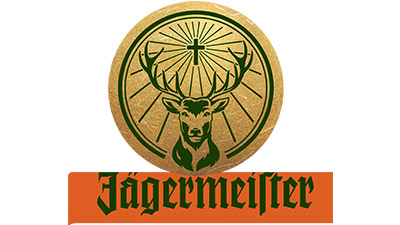
Established as a vinegar factory and wine trader in the Lower Saxony town of Wolfenbüttel in 1878, the company launched its first herb liqueur under the name of Jägermeister in 1935. The secret recipe comprising 56 herbs remains unchanged from those early days.
Mast-Jägermeister SE grew from a small family business to an international organisation, and is now in the fifth generation of family ownership. In 2020, the company recorded global sales of 89.6 million 0.7 litre bottles, now selling the main product Jägermeister in more than 150 countries.
Jägermeister has around 1000 direct employees. Resellers and external distribution partners around the world add to the large number of people requiring training.
Top-quality training in line with the brand
Before corona, Jägermeister took a rather traditional approach to learning and knowledge-sharing. In most cases, new employees, distribution partners and resellers were invited directly to the headquarters in Wolfenbüttel to help them learn about the brand and understand it better. There, they would receive all the necessary training on the products and get a feel for the brand.
Yet, even before the pandemic, it was clear that this system needed to be optimised, and Jägermeister started to look into procuring a learning management system (LMS). Professional training courses in e-learning format were also on the wish list back then.
The range of training to be covered by the LMS, individual learning nuggets and web-based training (WBT) went beyond the offering for external distribution and trading partners. For instance, different target groups from apprentices and trainees to the CEO needed to gain an in-depth understanding of e-commerce.
At the same time, a coherent and strong brand image that all employees identify with is a top priority for Jägermeister. Therefore, the learner experience was considered crucial.

A blended learning journey masterpiece
Jägermeister decided to use the imc Learning Suite as its learning platform. The well thought out extended enterprise scenario in combination with the clear module structure was a major deciding factor in favour of imc. The Learning Suite also scored with its customisable configurability and great system reliability.
Simply sharing knowledge is not enough – it also has to be packaged right to reach all target groups and meet their needs. To this end, imc created a sophisticated blended learning scenario for Jägermeister.
Kathrin Heidler, Instructional Designer at imc, analyses the collaboration with Jägermeister: “What set the project apart is how complex it was. A blended learning journey embedded in classroom training, web-based training, performance cards and our BizQuiz is far from routine – even for us!
We were really able to go all out with this project. It was great fun helping to design such a complex project using a large variety of techniques.”

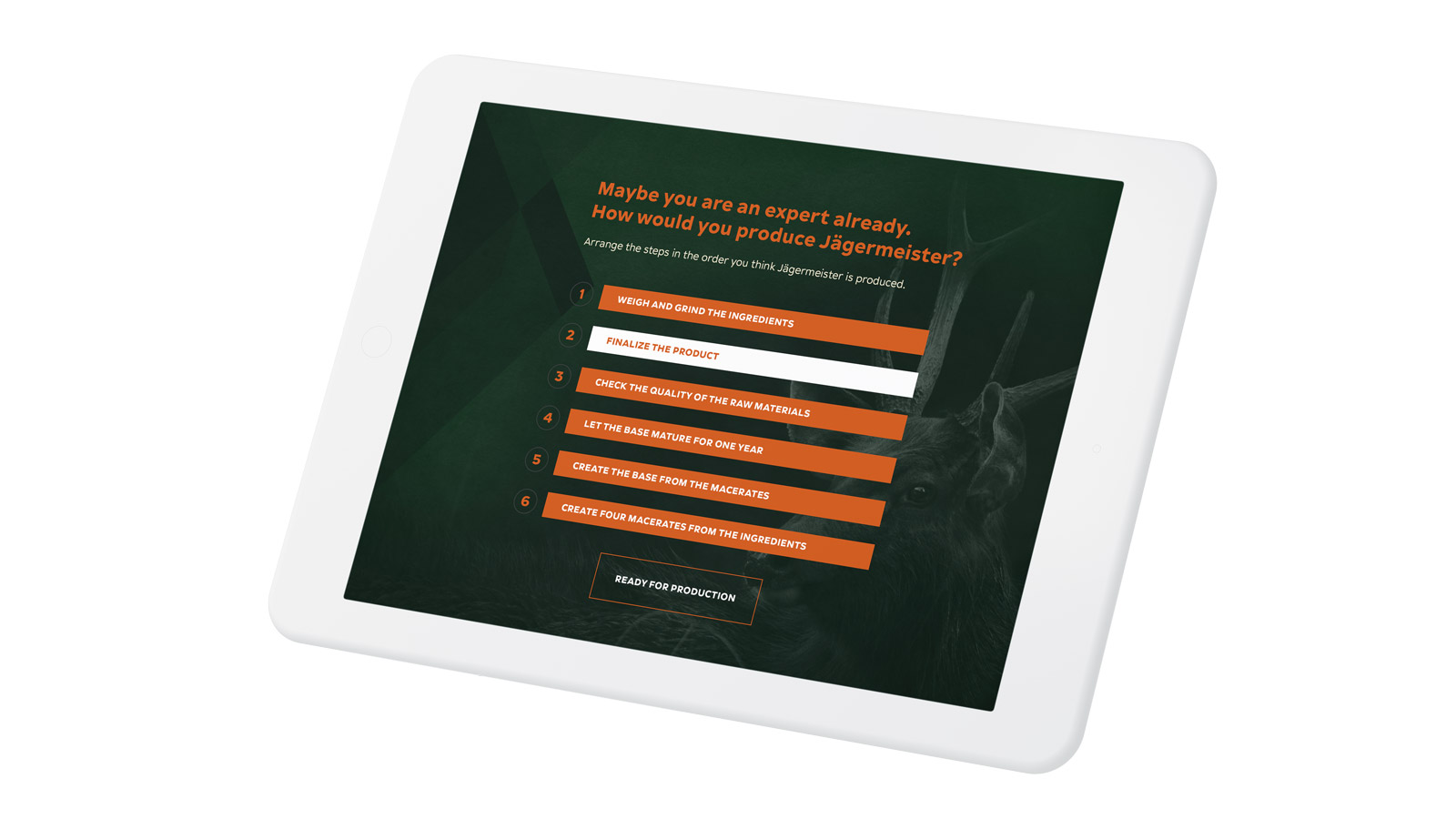
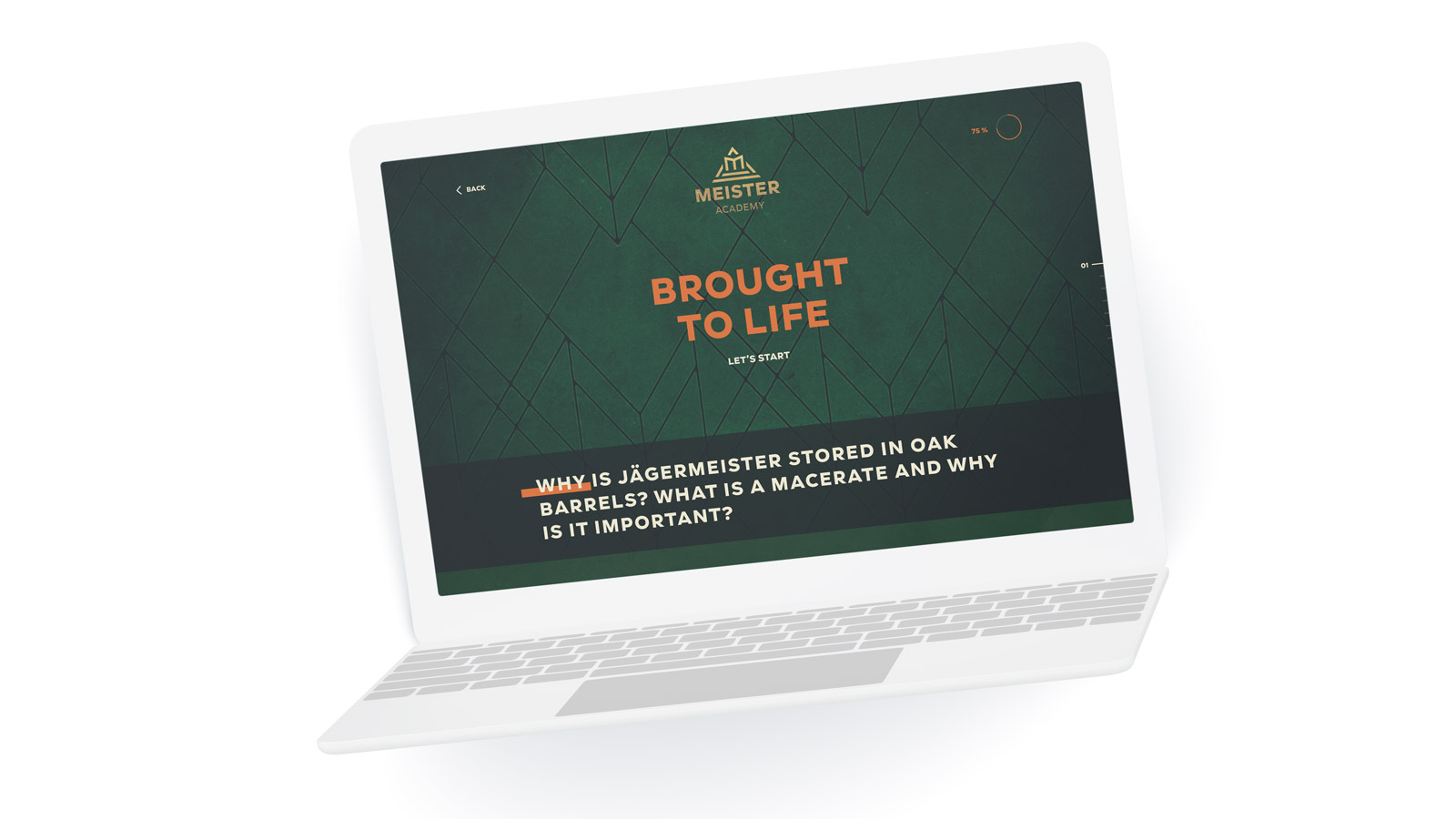
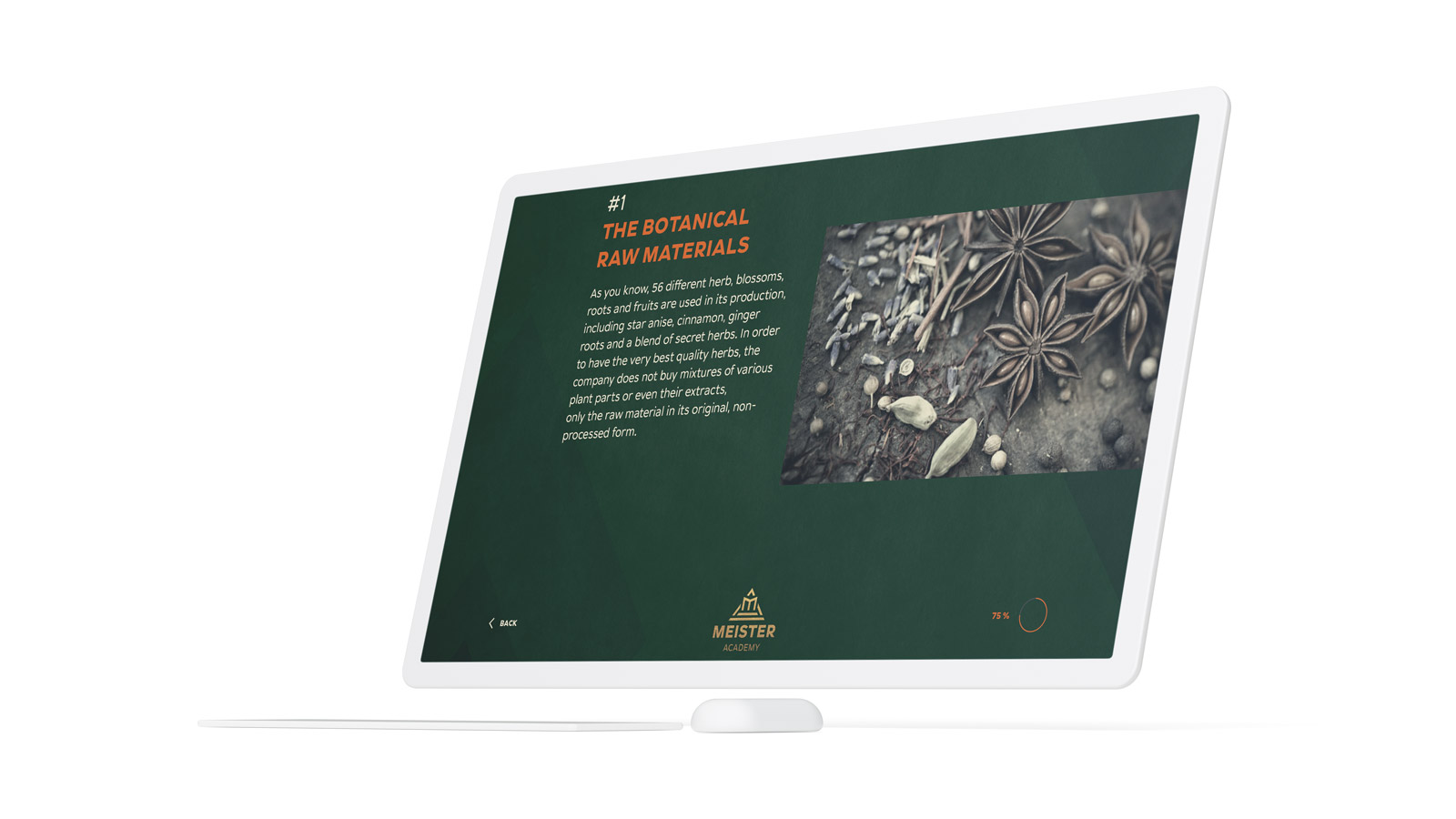




Learning that doesn’t feel like learning
The feedback for the initial platform tests was all positive. Users were especially taken with how the e-learning content triggered an emotional response. The consensus among the employees: Once you log in to MeisterAcademy, the training courses don’t feel like learning. The direct integration of LinkedIn learning courses was also received very favourably, as it gives employees an even greater choice of courses.
Philipp Terstesse, Manager Global Trade Marketing at Jägermeister, summarises: “Our goal was to create a learning experience that takes a new approach and motivates learners. The learner and employee experience were extremely important to us.
We firmly believe that our digital ambitions go a long way towards shaping the future of our brand. We are thrilled to have a strong partner in imc who will stay by our side as we embark on this journey into the future together.”


A slightly different kind of
compliance training

Audi is one of Germany's leading premium car manufacturers. Based in Ingolstadt and Neckarsulm, Germany, the company has been producing high-quality vehicles since 1909 and is now part of the Volkswagen Group.
Motivation for an unloved topic
When employees learn that they have to attend compliance training, their enthusiasm is often limited. The trainees are usually hostile to the training even before it begins.
Audi therefore wanted to train employees with an unusual compliance training course in such a way that the necessary knowledge is clearly conveyed to them and, ideally, they also have fun during the training.

Web-based training of a different kind
“Welcome to Fraud City. The city “eats” its residents – skin, hair and all. We hope you’re up to it. Enter at your own risk.” This intro sounds ever so slightly different to the traditional “Click here to start your training”.
The entire web-based training course with motion design adopts the style of “Sin City”, and takes the brave participant to a corrupt city full of dangers and suspect colleagues – accompanied by Detective Fraudless who is always on the brink of solving yet another crime and starts off by explaining the rules.
As the employee navigates through the training course, the criteria for identifying cases of fraud are revealed, as are the behavioural patterns that call for special attention.

Positive feedback on the intranet

Audi demonstrated great courage with this unconventional concept – and reaped the rewards: The elaborate and polarising concept leaves a lasting impression, creating a buzz among almost all employees. Similarly, the intranet feedback was predominantly positive, and many employees praised the web-based training, as Laura Schumacher from the Audi compliance department confirms.
- “Great job! This makes ‘learning’ fun!”
- “Very pleasant WBT, executed superbly. That’s what I’d call modern. Let’s have more of this.”
- “I thought the presentation of the WBT as a homage to Sin City with L.A. Noire elements was extremely original. A great example for knowledge transfer in an entertaining package. Keep it up!!!”
- “We need a lot more web-based training in this style. It gets the message across in an entertaining and easy-to-understand manner, well narrated with cool stories!”

A holistic learning management experience for Australia’s national rugby league
Reinvigorating the learning centre of Australia’s second largest professional sporting association

The National Rugby League (NRL) is the world’s premier rugby league competition run by the Australian Rugby League Commission. It is the second biggest professional sporting association in Australia and is the dominant sport in the states of New South Wales and Queensland.
With sixteen teams in Australia and New Zealand, the NRL is synonymous with Australia’s sports culture and is the best-attended rugby league in the world. It was founded in 1998 as a merger of two competing leagues, but its roots reach right back to 1908.

THE BACKGROUND
A learning management solution with limited functionality
The NRL needed to reinvigorate its NRL Learning Centre, which provided training for coaches, referees, trainers and volunteers.
The Learning Centre also offered accreditation programmes for aspiring NRL referees, and
LeagueSafe: an online safety awareness course for parents and volunteers at children’s games, which was designed to help create a healthy and safe rugby league environment for young players.
At the heart of the LMS was an outdated Content Management System (CMS) which at the back end did not give users much autonomy over their content or integrate effectively with the league’s membership database.
Modernising the Learning Centre System
There were several challenges for the NRL with their current suite of technology, and they were using multiple systems for differing purposes, many of which were not performing well.
The LMS included a coach reaccreditation programme which was poorly organised and did not effectively address many different skill levels. It also included a referee training programme that had a high dropout rate, which indicated a poor user experience.
In addition to the LMS they were using for the NRL Learning Centre, the league also needed to use a third party system to manage all of their certifications, and it was proving very difficult to track and report on these internally.

A fully-integrated NRL Learning Centre portal
Our solution was the implementation of a new LMS to combine the functions of the two previous systems it was using. The new system enables users by giving them greater control over content, certification management, and syncing with the membership database
The system consists of an interactive e-learning programme using imc’s Chatbot framework, with options for all experience levels. The programme contains scenario-based learning modules that account for different personality types and the challenges they present at games.
The Coach Reaccreditation and Referee Training programmes are now also using imc technology to provide an entertaining and informative journey to users. The new system provides students with the opportunity to learn through a variety of real-world scenarios that best fit their interests (for example, age-appropriate training for children or teenagers). Each learner has access to video examples of real-life, correct and incorrect performances.
As part of the redevelopment, we reinvigorated the referee-accreditation programme with real game footage and used an authoritative subject matter expert (SME), Kasey Badger, to attract referees from all walks of life.
A rejuvenated approach
This project successfully helped to rejuvenate the learning approach for our client, and the LMS solution was delivered both on time and within budget.
Not only did NRL meet its original objectives, but post-implementation, there was an uplift of the participation rates for online learning and positive feedback from users of the upgraded NRL LeagueSafe courses.


Reframing orientation
Remember when you last joined a company? How did you feel? What did you care about?

The Department of Health and Human Services (DHHS) plays a critical role in the health system of the state of Victoria in Australia and is responsible for meeting the health needs of Victorian locals.
They deliver policies, programs and services that support and enhance the health and wellbeing of all of Victoria, Australia, and represent a large and complex state department showcasing leading service and innovation across the health sector.
With over 11,000 employees across four operational divisions, they oversee and coordinate the delivery and funding of services and initiatives across 17 areas of the state.
Creating one unified onboarding experience
When the department first approached imc with their needs for orientation, it became clear that policy, compliance and general information had become their core focus.
The department was in need of a digital orientation experience for all new and existing employees. A unique and innovative solution that actively began to establish and recognise a greater vision of their employee experience lifecycle and culture as a whole. But the department is a large and complex organisation that has the challenge of hosting a very dynamic and diverse audience that works across multiple sectors.
A core challenge imc had to achieve was to bring these diverse users together through one unified onboarding experience.
What an employee experiences as they should be joining a new organisation should be personalised, compelling, and memorable. Onboardings, orientations and inductions represent three of the most significant opportunities to provide a human-centred approach to an employee’s experience.
When done well, they get new hires up and running smoothly and can empower your people to think, act and see your company as one which delivers exceptional service.
At imc, we have felt privileged to have the opportunity of co-designing with over 50 employees across the department to deliver something meaningful: a core staple of their employee experience.

Co-designing to bring people together
By co-designing directly with the people imc was designing for, the team at imc could address a lot of the needs and challenges the department was experiencing more directly.
When taking the time to communicate with them, the team could quickly unlock insights that lead to success. They asked people to develop several personas of what “great” looked for them. Then these insights were used to define the common factors and principles of success through their eyes.
So imc discovered that they could align department employees more effectively by providing an experience that enabled them to explore the culture openly. The key to success was to empower their ability to guide themselves to find information and support when needed.
From the workshop insights, the team applied a co-designed content strategy to deliver a meaningful experience for employees.
A fully-realised digital experience for employees
The result of this was a 20-minute mobile-first orientation experience for the department. Using a chatbot style interactions, the learner is greeted and guided by characters of the department in a conversational format and narrative. They are asked questions and provided with micro-sized content as they progress through their learning experience.
imc included multiple elements of personalisation, such as stories from the people we were designed for. That way, it felt like an experienced they owned.
The project won the Platinum award in the category Best Design Thinking Talent Strategy in the 2020 LearnX awards. The international award program honours innovative and creative projects in the fields of learning and design every year.

Working side by side with end-users
By co-designing directly with the people we were designing for, we could address a lot of the needs and challenges the department was experiencing more directly.
When we take the time to communicate with the people we are designing for, we can quickly unlock insights that lead to success. We asked people to develop several personas of what “great” looked for them. We then used these insights to define the common factors and principles of success through their eyes.
We discovered that we could align department employees more effectively by providing an experience that enabled them to explore the culture openly. The key to success was to empower their ability to guide themselves to find information and support when needed.
From the insights we gathered from our workshops we applied a co-designed content strategy to deliver a meaningful experience for employees.

A comprehensive onboarding and learning experience

The Green Climate Fund (GCF) is a fund established within the framework of the United Nations Framework Convention on Climate Change (UNFCCC) as an operating entity of the financial mechanism to assist developing countries in adaptation and mitigation practices to counter climate change.
The GCF is based in Incheon, South Korea, and has raised USD 10.3 billion equivalent in pledges from 49 countries.

THE BACKGROUND
A collective vision for new starters
The Green Climate Fund desired to deliver a comprehensive onboarding and induction program that provides a sound understanding of GCF's climate focus, shared values, governance, policies and practices. This would be underpinned by a newly formed learning experience framework and strategy for its realisation and deployment.
To achieve this vision, imc set out on a co-creative 5-week journey to discover, define, translate and align up to 20-hours of proposed learning to not only deliver on its requirements but to further provide the ideal experience for a new starter.
This was achieved by connecting everything back to the organisation's greater ecosystem of all things learning, development, knowledge management, change and performance.
Along the way, imc discovered a holistic framework for learning, developed a multi-pathway curriculum framework and learning strategy, while further defining the overarching narrative and experience to be shared by all new starters.
Making sense of diversity and complexity
To design such a large scale orientation solution, there was a large process of consolidating, defining and uniting many factors of content and experience. We had to consider that with every new starter who joins the Green Climate Fund, there is a different story to tell.
Therefore, we had to understand their perspectives and identify the universal needs shared by many of these new starters, such as setting up a new life far away from home. Additionally, across GCF, there are over 80 languages combined with an incredibly complex subject matter concerning climate and financial science that needs to have its learning performance analysed correctly.

The Learning Experience Framework
imc took the time to acquire a vast collection of research insights and begin a process of sense-making. Through this, the seemingly disconnected begins to take on new forms of service and experience.
This is precisely what happened as we began to explore the three emerging modes of education, exposure and experience. To validate the path we found ourselves on, we mapped what expert participants said we needed, against what end users said they desired, to have the ideal orientation experience.
Where we landed was at the beginning of a robust Learning Experience Framework; capable of not only driving all aspects of the orientation project in question but across the entirety of GCF with strategic foresight.
The Learning Experience Framework is a continuous model of learning and development which embeds opportunities of meaningful experience, exposure and education to occur across all aspects and areas of the Green Climate Fund. The Learning Experience Framework grounds the education components of the orientation by providing clarity and insight into what belongs within it at an organisational level.
Our focus on orientation for education
By gaining clarity of the bigger picture, we were able to move forward more gracefully.
We began by finalising this newly discovered Learning Experience Framework, and then proceeded with an in-depth meta-analysis of all proposed digital learning topics for the Orientation.

Within the 20 hours of Digital Orientation Modules, we identified the need to focus on four core types of digital learning approaches to meet the diversity of needs we discovered throughout our research. These are:
- Storytelling
- Scenario-based learning
- Problem-based learning, and
- FAQ and resource
Through creative and innovative design, these four approaches will create optimal coverage of all content being delivered across the 20 hours of education. The orientation for the education project is currently in discussion with GCF.
Overall, the client feedback was incredibly positive towards the professionalism and quality of performance by imc team.
Furthermore imc and the Green Climate Fund were recognised as Platinum winners in the 2021 LearnX awards. The international award program honours innovative and creative projects in the fields of learning and design every year.
Culture Change Through E-Learning on the Factory Floor

The RONAL GROUP is a leading manufacturer in the international market for light alloy wheels and has about 7,000 employees worldwide.
Founded in 1969, the Swiss-headquartered company has 13 production locations on three continents and is an OEM for all the world’s leading manufacturers of cars.
RONAL produces some 18 million wheels annually, and generated sales of EUR 1 billion in 2021.
Cross-departmental training for all workers, from white to blue-collar
“We make the best wheels in the world.” The RONAL GROUP’s vision statement is an uncompromising commitment to top quality. To live up to this claim, all the company’s employees need to be committed to quality and work to defined standards.
This applies to all employees, wherever they are based, whether in Switzerland, Taiwan, Mexico or elsewhere, and whatever their role, whether office or factory worker. Everyone throughout the RONAL GROUP needs to live and breathe quality so that the company can live up to its quality promise and meet the demanding standards of the automotive industry.
That was one part of the challenge. At the same time, the company wanted to digitalise its systems for documenting training completion. It wanted to do away with the labour-intensive, manual processes of keeping lists and gathering, signing and scanning paper certificates. Going digital would not only give the company a clearer overview of its training landscape, it would also reduce the error rate inherent in manual processing.

An enterprise-wide blended learning strategy
In order the better to administer, sustain and document its training courses, the RONAL GROUP decided to digitalise all learning-related processes using a learning management system (LMS). First and foremost, the managers in charge of the project at RONAL were looking for an LMS that could be integrated into the company's existing system landscape. Moreover, it should be easy and intuitive to use.
As well as the LMS itself, they were looking for a provider who could develop tailored training courses and enable the company to create its own learning content.
imc Learning Suite, the LMS provided by imc Learning, met all of these requirements. It has now been implemented at the RONAL GROUP as an employee development centre (EDC). The EDC is now used to administer all the company’s online training courses, as well as analogue courses.
Where once the various steps involved – everything from participant invitations by email to course completion to certification and verification – could only be accomplished by switching between media. Now they are all digitalised and can be coordinated via a single system.
HR managers with the relevant access privileges can now log in to get an overview of which training courses have been started or completed, and by whom. And employees can use their personal log-in credentials to check their learning progress. As well as this, all employees can independently search for and request courses from within the platform.

The beginnings of a culture shift through targeted anytime, anywhere training
Philipp Leupoldt from Group Learning & Development at the RONAL GROUP provides support for the learning platform and also had a hand in the development of the first digital training courses. He has noticed that carefully targeting the training to key groups of employees encourages new ways of thinking that lead gradually to a culture shift throughout the company.
This is clear from two e-learning programmes in particular.
One is a training course on quality awareness which, in terms of methodology and didactic approach, is specially designed for blue-collar workers and can be undertaken either using tablets while on the shop floor or using PC workstations located nearby.

The other programme is a training course for all RONAL GROUP employees designed to raise awareness of social engineering – the risk of being manipulated into disclosing sensitive information, such as passwords. The online content is supported by a poster campaign that specifically targets blue-collar workers.
The posters, which are displayed in staff cafeterias, production halls, common rooms, and staff facilities, summarize the learning content in the form of a comic strip. They also feature a QR code that employees can scan to receive further information on an internal page.
Leupoldt is pleased with the outcome. “We can see that the various measures and digital training courses are slowly giving rise to a genuine shift in culture,” he says. “Many of our blue-collar workers have demonstrated a matter-of-fact and pragmatic attitude to digital learning. The feedback from many other of our employees has been positive as well. Interest in work-related content is increasing, and the innovative methods are fostering independent learning.”

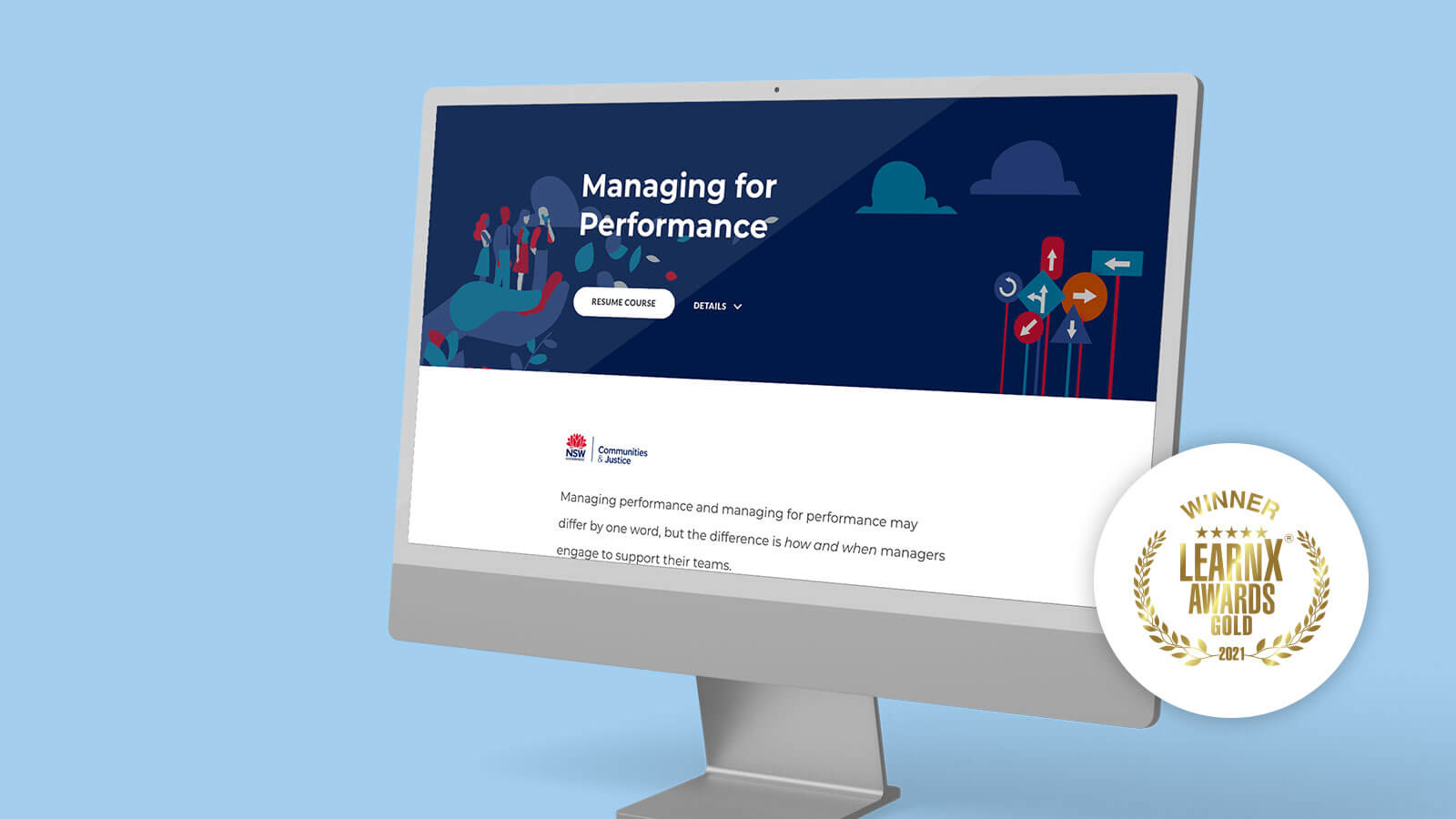
Helping to create a scaffold for what “good performance” looks like

In June 2020, 3% of people at the NSW Department of Communities and Justice had completed a Performance Development Plan.
These plans are important because they reflect conversations between managers and the individuals in their team. The conversations are an opportunity to talk about goals, trade feedback, and create clarity on what ‘good performance’ looks like.

THE BACKGROUND
The need for more frequent conversations
In 2019, the NSW Government brought together the departments of Family and Community Services and Justice to form the Department of Communities and Justice.
The Department partnered with imc Australia, seeking to embed a program that supports managers to have more frequent performance conversations that are not tethered to formal reviews.
Ten DCJ employees and two imc consultants worked together to co-design a solution that focused on gaining the audience's trust, attention, and motivation and delivered them the information and supports to manage for performance confidently.
Three workshops, one for discovery, the second for analysis and the third for conceptualisation and service mapping, were conducted. They focused on aligning the team to the vision and potential to design more than an eLearning module and still stay within scope.
By considering the managers, their challenges, but also the opportunity to make a more significant impact across the organisation, the design process put the managers' needs and the organisation's requirements at the heart of the solution.
A newly merged government department
The bringing together of people, processes and technology created a unique circumstance where over twenty thousand geographically dispersed people needed to collaborate in service of the taxpaying people of NSW.
Nationally, labour market data says that social assistance industries and organisations like the NSW Department of Communities and Justice are expected to grow by 14.2% before 2025.
With more employees, the Department recognised that a performance culture that aligned their people would be business-critical.

Formal and informal learning
Launched from the DCJ LMS and intended to respond to any screen available to geographically diverse learners, this solution used three fundamental approaches:
- Acknowledge the preconceived idea that performance conversations are difficult, uncomfortable, and unnecessary.
- Include a hero who finds the confidence to have performance conversations and unintentional villains who detract from the hero’s journey.
- Simplify the call to action.
To summarise the eLearning and focus on the ‘why’, a short animation was developed to act as a lightning rod to attract managers and employees' trust, attention, and motivation.
Understanding that talking about performance can be complex; the 3-minute animation demonstrates that performance conversations are an opportunity for managers and employees to work together and discuss opportunities. The target audience for the animation is wider and designed to create interest in the broader program.
Building on Success
To be precise, 6,960 people have been given a genuine opportunity to discuss their career aspirations and goals.
The increase in Performance Development Plans proves that the performance support project that scaffolded the existing performance management responsibilities has worked to:
- impart skills needed to have performance conversations in a compelling and productive way.
- instilled managers with the confidence and motivation to engage in a performance conversation.
There are approximately 3,900 managers at DCJ, 1,035 of whom have completed the program.
This means that 4.8% of DCJ employees have created an impact on 1 in 3 of their colleagues.
imc and the Department of Communities and Justice were recognised as Gold winners in the 2021 LearnX awards. The international award program honours innovative and creative projects in the fields of learning and design every year.
